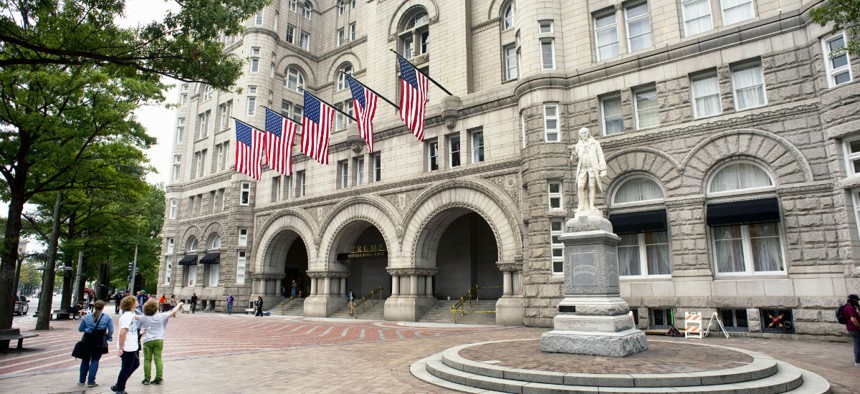GSA Will Examine Ethics Issues Around Trump’s D.C. Hotel Lease
President-elect’s stewardship of the Old Post Office Pavilion is a conflict of interest, procurement experts say.
When the General Services Administration made good on its plan to find a new use for the largely empty but historic Old Post Office Pavilion in Washington, it made clear that the deal it announced in June 2013 was a 60-year lease, not a change in ownership.
When the agency unveiled the winning bidder, the Trump Organization, few could have imagined that chief owner Donald Trump would go on to be elected president.
Now that the Trump International Hotel, unveiled this September, is up and running just blocks from Trump’s presidential transition team, a pair of former White House procurement office contracting specialists is crying foul. And they have GSA’s attention, Government Executive has learned.
“The 60-year deal presents unprecedented and intolerable conflicts of interest,” wrote Steven Schooner, the former associate administrator for procurement law and legislation at the Office of Federal Procurement Policy in the Office of Management and Budget during the Clinton administration. Schooner, now professor of government procurement law at The George Washington University, and academic colleague Dan Gordon, President Obama's first federal procurement policy administrator, argued in a Washington Post op-ed this week that “swift action by GSA is necessary to protect the integrity of the federal government contracting process.”
By keeping the lease, now that Trump is to be leader of the free world, he “puts his own employees in an untenable situation guaranteed to undermine the integrity—and the perception—of the procurement process,” they write.
The regulations, note Schooner and Gordon, include a prohibition on an agency entering into contracts with federal employees, and will require detailed disclosure of financial information on the running of the luxury hotel along with renegotiations of rent.
The Trump Organization’s lease with GSA, the two write, states that “no . . . elected official of the government of the United States . . . shall be admitted to any share or part of this lease, or to any benefit that may arise therefrom.”
Hence, they call upon GSA to terminate the lease, even at the risk of lawsuits and liability for monetary damages.
Trump’s lawyers’ position, according to the authors, is that the president is exempt from many of the ethics rules that apply to other government employees, and that his adult children will handle the hotel business. (The fact that his offspring are involved in the transition team raises new questions, the federal contracting specialists note.)
Asked for comment, a GSA spokesperson told Government Executive, “Per the Old Post Office Building Redevelopment Act of 2008, Congress directed the General Services Administration to redevelop the Old Post Office building. GSA ran a fair and open competition, subject to careful and rigorous review . . . GSA negotiated a lease with the Trump Organization and submitted the details to Congress prior to signing the lease in August 2013.
“It is the Office of Government Ethics that provides guidance to the executive branch on questions of ethics and conflicts of interest,” the spokesperson said. “GSA plans to coordinate with the president-elect’s team to address any issues that may be related to the Old Post Office building.”
Trump himself, on the campaign trail last March, sang the praises of GSA, calling the work on the Old Post Office “just about the hottest job that they’ve ever put out to bid, and by the way, the GSA people are terrific people.”
Image via mj007/Shutterstock.com.




